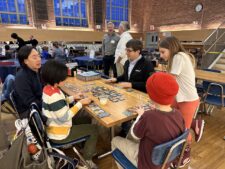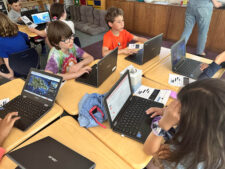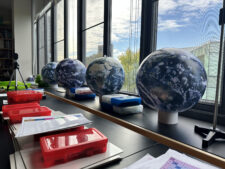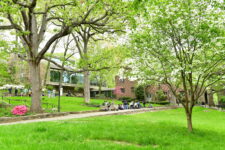Fieldston Lower 4th Graders have hit the pool to develop lifesaving and basic water safety skills. After an initial introduction to regular swim classes in 3rd Grade, 4th Graders are now advancing their technique and mastering freestyle, backstroke, and butterfly during their fall unit.
Taught by Physical Education Teachers Stefanie Sporton, Maeve Seward, and Danielle Gabriel alongside Aquatics Manager Pamela Opdyke, a recent 4th Grade swim class began with students crossing the pool using kickboards. Starting on their fronts and then switching to their backs, each student’s range of skill varied, but the group collectively challenged themselves to practice backstroke without the help of boards. With Opdyke demonstrating arm movements from the pool’s edge, they ended class by treading water, holding their hands above the surface to see how long they could keep going.



“It helps them overcome challenges; they learn adversity and how to push through hard things,” says Gabriel, noting that the class may be many students’ first experience in such a large pool. “It teaches them in a very safe and controlled environment to go outside their comfort zones and achieve small things without being too scared to do them. Then it allows them to do that in other places in their lives.”
Comparing this to students facing a difficult classroom lesson, Gabriel adds that students are happy to do what they enjoy, prompting the PE team to emphasize that difficult things also require effort. “It’s important to show ourselves that we can do things even when it’s not our favorite,” she says. “‘We do many cooperative activities like games, so students also learn to work together.”



This physical activity contributes to students’ well-rounded experiences at Fieldston Lower and foreshadows the more complex swimming skills introduced in middle and high school classes. Sporton, Seward, and Gabriel also aim to understand how 4th Graders’ classroom strengths translate to their perseverance in the pool.
“We’re looking at each child as a person, not just as a student in our content area,” Gabriel says. “We want to know what they do in math, science, or reading. We also focus on process and progress over outcomes, ensuring that our kids know it’s okay if we come in at different places, as long as we’re progressing and working through that process together.”



